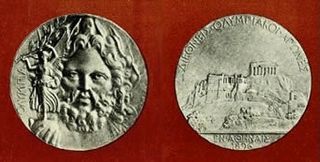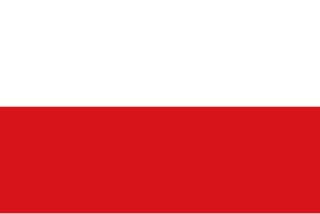
The Summer Olympic Games, also known as the Games of the Olympiad, and often referred to as the Summer Olympics, is a major international multi-sport event normally held once every four years. The inaugural Games took place in 1896 in Athens, Greece, and the most recent Games were held in 2021 in Tokyo, Japan. The International Olympic Committee (IOC) is responsible for organising the Games and for overseeing the host city's preparations. The tradition of awarding medals began in 1904; in each Olympic event, gold medals are awarded for first place, silver medals for second place, and bronze medals for third place. The Winter Olympic Games were created out of the success of the Summer Olympic Games, which are regarded as the largest and most prestigious multi-sport international event in the world.
At the 1896 Summer Olympics, two tennis events were contested, both for men. They began on 8 April and continued on 9 April, 10 April, and 11 April. 13 or 15 competitors from six nations, including seven Greeks, took part in the tennis competition. Many of the doubles teams were of mixed nationality, including all three medalist pairs. None of the leading players of the time such as Wimbledon champion Harold Mahony, U.S champion Robert Wrenn, William Larned or Wilfred Baddeley participated. To strengthen the field, the organization added sportsmen from other Olympic events, including weightlifter Momčilo Tapavica, hammer thrower George S. Robertson and 800-metres runners Edwin Flack and Friedrich Traun.

At the 1896 Summer Olympics, the first modern Olympiad, twelve athletics events were contested. A total of 25 medals were awarded. The medals were later denoted as 37 modern medals. All of the events except the marathon were held in the Panathinaiko Stadium, which was also the finish for the marathon. Events were held on 6 April, 7 April, 9 April, and 10 April 1896. Altogether, 63 athletes, all men, from nine nations competed. This made athletics the most international of the nine sports at the 1896 Games.
Edwin Harold Flack was an Australian athlete and tennis player. Also known as "Teddy", he was Australia's first Olympian, being its only representative in 1896, and the first Olympic champion in the 800 metres and the 1500 metres running events.
The 1900 Summer Olympics were held in Paris, France, from May 14 to October 28, 1900, as part of the 1900 World's Fair.

The 1896 Summer Olympics, officially known as the Games of the I Olympiad, were a summer multi-sport event held in Athens, the capital of Greece, from 6 to 15 April 1896, and were the first Olympic Games of the Modern era.

Australia has sent athletes to all editions of the modern Olympic Games. Australia has competed in every Summer Olympic Games, as well as every Winter Olympics except 1924–32 and 1948. In 1908 and 1912 Australia competed with New Zealand under the name Australasia.

Germany competed at the 1896 Summer Olympics in Athens, Greece. The Germans were the third most successful nation in terms of both gold medals and total medals (13). Gymnastics was the sport in which Germany excelled. The German team had 19 athletes. The Germans had 75 entries in 26 events, taking 13 medals.

Ten athletes from the United Kingdom of Great Britain and Ireland competed in seven sports at the 1896 Summer Olympics. The Great Britain athletes were the fifth most successful in terms of overall medals (7) and tied for fifth in gold medals (2). The 7 medals came on 23 entries in 14 events.

Australia competed at the 1900 Summer Olympics in Paris, France. Most Olympic historians keep Australian records at early Olympics separate from those of the United Kingdom despite Australia's lack of independence at the time.

Denmark competed at the 1900 Summer Olympics in Paris. The Danish contingent, 11 men, competed in 4 sports and had 30 entries in 14 events. 3 Danish athletes also competed in Tug-of-War under the mixed team flag.

Athletes from the United Kingdom, all but three of its Overseas Territories, and the three Crown Dependencies, can compete in the Olympic Games as part of Team GB. Athletes from Northern Ireland can elect to represent either the UK or 'Team Ireland'. It has sent athletes to every Summer and Winter Games, since the start of the Olympics' modern era in 1896, including the 1980 Summer Olympics, which were boycotted by a number of other Western nations. From 1896 to 2020 inclusive, Great Britain & Northern Ireland has won 918 medals at the Summer Olympic Games, and another 32 at the Winter Olympic Games. It is the only national team to have won at least one gold medal at every Summer Games, lying third globally in the winning of total medals, surpassed only by the United States and the former Soviet Union.

Greece has a long presence at the Olympic Games, as they have competed at every Summer Olympic Games, one of only five countries to have done so, and most of the Winter Olympic Games. Greece has hosted the Games twice, both in Athens. As the home of the Ancient Olympic Games it was a natural choice as host nation for the revival of the modern Olympic Games in 1896, while Greece has also hosted the 2004 Summer Olympics. During the parade of nations at the opening ceremony of the Olympic Games, Greece always enters the stadium first and leads the parade to honor its status as the birthplace of the Olympics, with the notable exception of 2004 when Greece entered last as the host nation. Before the Games the Olympic Flame is lit in Olympia, the site of the Ancient Olympic Games, in a ceremony that reflects ancient Greek rituals and initiates the Olympic torch relay. The flag of Greece is always hoisted in the closing ceremony, along with the flags of the current and the next host country.

The modern Olympic Games were founded by French historian Pierre de Coubertin. France has competed in every edition, with the possible exception of the 1904 Games.

The Kingdom of Bohemia, an autonomous part of Austria-Hungary until 1918, competed at some of the early modern Olympic Games. The team made its debut at the 1900 Summer Olympics. After World War I, Bohemia became part of the new Czechoslovakia, and Bohemian athletes competed for Czechoslovakia at the Olympics. After the 1992 Summer Olympics and the dissolution of Czechoslovakia into the Czech Republic and Slovakia in 1993, Bohemian athletes competed for the Czech Republic at the Olympics. If these post-war appearances are counted, Bohemia has missed only three Olympics: the inaugural 1896 Summer Olympics, the 1904 Summer Olympics and as Czechoslovakia, the 1984 Summer Olympics which were boycotted by the USSR and its satellites.

The all-time medal table for all Olympic Games from 1896 to 2022, including Summer Olympic Games, Winter Olympic Games, and a combined total of both, is tabulated below. These Olympic medal counts do not include the 1906 Intercalated Games which are no longer recognized by the International Olympic Committee (IOC) as official Games. The IOC itself does not publish all-time tables, and publishes unofficial tables only per single Games. This table was thus compiled by adding up single entries from the IOC database.
The men's 1500 metres race, the longest flat-track race of the 1896 Summer Olympics programme, was the last event on 7 April. It was run in a single heat, with eight athletes competing.

Early modern Olympic Games allowed for individuals in a team to be from different nations. The International Olympic Committee (IOC) grouped their results together under the mixed team designation. A total of 25 medals were won by mixed teams in the first three modern Games, from 1896 to 1904.

Table tennis competition has been in the Summer Olympic Games since 1988, with singles and doubles events for men and women. Athletes from China have dominated the sport, winning a total of 60 medals in 37 events, including 32 out of a possible 37 gold medals, and only failing to win at least one medal in one event, the inaugural Men's Singles event at the 1988 Summer Olympics.

Russia participated at the 2010 Summer Youth Olympics in Singapore. The Russian team consisted of 96 athletes competing in 20 sports: aquatics (swimming), archery, athletics, basketball, boxing, canoeing, fencing, gymnastics, handball, judo, modern pentathlon, rowing, sailing, shooting, table tennis, taekwondo, tennis, volleyball, weightlifting and wrestling. Viktoria Komova won most medals, with 3 gold medals and 1 bronze medal.














